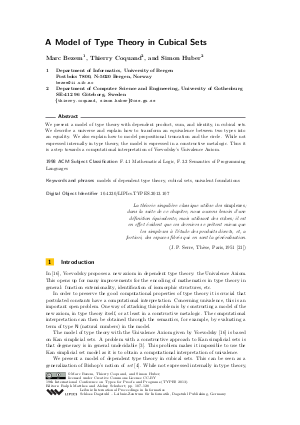A Model of Type Theory in Cubical Sets
Authors Marc Bezem, Thierry Coquand, Simon Huber
-
Part of:
Volume:
19th International Conference on Types for Proofs and Programs (TYPES 2013)
Part of: Series: Leibniz International Proceedings in Informatics (LIPIcs)
Part of: Conference: International Conference on Types for Proofs and Programs (TYPES) - License:
 Creative Commons Attribution 3.0 Unported license
Creative Commons Attribution 3.0 Unported license
- Publication Date: 2014-07-25
File

PDF
LIPIcs.TYPES.2013.107.pdf
- Filesize: 0.57 MB
- 22 pages
Document Identifiers
Subject Classification
Keywords
- Models of dependent type theory
- cubical sets
- Univalent Foundations
Metrics
- Access Statistics
-
Total Accesses (updated on a weekly basis)
0Document
0Metadata
Abstract
We present a model of type theory with dependent product, sum, and identity, in cubical sets. We describe a universe and explain how to transform an equivalence between two types into an equality. We also explain how to model propositional truncation and the circle. While not expressed internally in type theory, the model is expressed in a constructive metalogic. Thus it is a step towards a computational interpretation of Voevodsky's Univalence Axiom.
Cite As Get BibTex
Marc Bezem, Thierry Coquand, and Simon Huber. A Model of Type Theory in Cubical Sets. In 19th International Conference on Types for Proofs and Programs (TYPES 2013). Leibniz International Proceedings in Informatics (LIPIcs), Volume 26, pp. 107-128, Schloss Dagstuhl – Leibniz-Zentrum für Informatik (2014)
https://doi.org/10.4230/LIPIcs.TYPES.2013.107
BibTex
@InProceedings{bezem_et_al:LIPIcs.TYPES.2013.107,
author = {Bezem, Marc and Coquand, Thierry and Huber, Simon},
title = {{A Model of Type Theory in Cubical Sets}},
booktitle = {19th International Conference on Types for Proofs and Programs (TYPES 2013)},
pages = {107--128},
series = {Leibniz International Proceedings in Informatics (LIPIcs)},
ISBN = {978-3-939897-72-9},
ISSN = {1868-8969},
year = {2014},
volume = {26},
editor = {Matthes, Ralph and Schubert, Aleksy},
publisher = {Schloss Dagstuhl -- Leibniz-Zentrum f{\"u}r Informatik},
address = {Dagstuhl, Germany},
URL = {https://drops.dagstuhl.de/entities/document/10.4230/LIPIcs.TYPES.2013.107},
URN = {urn:nbn:de:0030-drops-46284},
doi = {10.4230/LIPIcs.TYPES.2013.107},
annote = {Keywords: Models of dependent type theory, cubical sets, Univalent Foundations}
}
Author Details
References
-
Steve Awodey and Michael Warren. Homotopy theoretic models of identity types. Mathematical Proceedings of the Cambridge Philosophical Society, 146:45-55, 2009.

-
Bruno Barras, Thierry Coquand, and Simon Huber. A generalization of Takeuti-Gandy interpretation. To appear in Mathematical Structures in Computer Science, 2013.

-
Marc Bezem and Thierry Coquand. A Kripke model for simplicial sets. Preprint, 2013.

-
Erret Bishop. Foundations of constructive analysis. McGraw-Hill Book Co., New York, 1967.

-
John Cartmell. Generalised algebraic theories and contextual categories. Annals of Pure and Applied Logic, 32:209-243, 1986.

-
Thierry Coquand and Nils Anders Danielsson. Isomorphism is equality. Indagationes Mathematicae, 24(4):1105-1120, 2013.

-
Sjoerd Crans. On combinatorial models for higher dimensional homotopies. PhD thesis, Universiteit Utrecht, 1995.

-
Pierre-Louis Curien. Substitutions up to isomorphisms. Fundamenta Informaticae, 19:51-85, 1993.

-
Peter Dybjer. Internal type theory. In Types for Programs and Proofs, pages 120-134. Lecture Notes in Computer Science, Springer, 1996.

-
Alexander Grothendieck. Pursuing stacks. Manuscript, 1983.

-
Martin Hofmann. Syntax and semantics of dependent types. In A.M. Pitts and P. Dybjer, editors, Semantics and logics of computation, volume 14 of Publ. Newton Inst., pages 79-130. Cambridge University Press, Cambridge, 1997.

-
Martin Hofmann and Thomas Streicher. Lifting Grothendieck universes. Unpublished Note.

-
Simon Huber. A model of type theory in cubical sets. Licentiate thesis, University of Gothenburg, 2014.

-
Witold Hurewicz. On the concept of fiber space. Proc. Nat. Acad. Sci. U. S. A., 41:956-961, 1955.

-
Daniel M. Kan. Abstract homotopy. I. Proc. Nat. Acad. Sci. U. S. A., 41:1092-1096, 1955.

- Chris Kapulkin, Peter LeFanu Lumsdaine, and Vladimir Voevodsky. The simplicial model of univalent foundations. Preprint, http://arxiv.org/abs/1211.2851, 2012.
-
Per Martin-Löf. An intiutionistic theory of types: Predicative part. In H. E. Rose and J. Shepherdson, editors, Logic Colloquium '73, pages 73-118. North-Holland, Amsterdam, 1975.

-
Christine Paulin-Mohring. Inductive Definitions in the System Coq - Rules and Properties. In Marc Bezem and Jan Friso Groote, editors, Proceedings of the conference Typed Lambda Calculi and Applications, number 664 in Lecture Notes in Computer Science, 1993.

- Andrew M. Pitts. An equivalent presentation of the Bezem-Coquand-Huber category of cubical sets. Manuscript, http://arxiv.org/abs/1401.7807, September 2013.
-
Andrew M. Pitts. Nominal Sets: Names and Symmetry in Computer Science, volume 57 of Cambridge Tracts in Theoretical Computer Science. Cambridge University Press, 2013.

-
Jean-Pierre Serre. Homologie simgulière des espaces fibrés. Applications. Thèse, Paris, 1951.

-
Allen Stoughton. Substitution revisited. Theoretical Computer Science, 59:317-325, 1988.

-
Ross Street. Cosmoi of internal categories. Trans. Amer. Math. Soc., 258:271-318, 1980.

- The Univalent Foundations Program. Homotopy Type Theory: Univalent Foundations of Mathematics. http://homotopytypetheory.org/book, Institute for Advanced Study, 2013.
-
Vladimir Voevodsky. The equivalence axiom and univalent models of type theory. Talk at CMU, February 2010.

-
Alfred N. Whitehead and Bertrand Russell. Principia Mathematica. Cambridge University Press, 2nd edition, 1925.

-
Richard Williamson. Combinatorial homotopy theory. Preprint, 2012.

